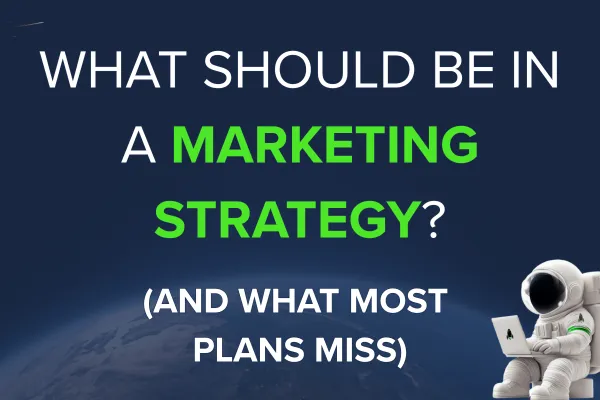
What Should Be Included in a Marketing Strategy?
What Should Be Included in a Marketing Strategy?
The six essentials every strategy needs to deliver growth and clarity
If you’ve ever asked yourself, “What exactly should be in our marketing strategy?” You’re in good company. It’s one of the most important questions a business leader can ask.
And yet, most companies either:
Confuse strategy with a calendar
Treat it like a wishlist of tactics
Or skip it entirely and try to market without a plan
Let’s fix that. In this article, we’ll break down what actually belongs in a marketing strategy, what you can leave out, and how to know if your strategy is built to drive real growth.
A Strategy Is Not Just a List of Tactics
Many companies believe they have a strategy when what they really have is a to-do list.
A true marketing strategy answers six key questions:
What are we trying to achieve?
How will we generate revenue?
Where is our opportunity to grow?
What do we have to work with?
What is the timeline to execute?
What might get in the way?
These six questions are not optional. They are the foundation of any clear, effective, and focused marketing plan.
What Should Be Included in a Marketing Strategy?
Let’s walk through each core component.
1. Clear Goals
Every strategy needs to start with measurable goals. These aren’t just business aspirations. They are clear benchmarks for success. Whether your goal is to generate 200 leads per quarter, increase customer lifetime value, or expand into a new market, your strategy should reverse-engineer how to get there.
2. Revenue Priorities
What product, service, or offer are you focused on growing? Not everything deserves equal marketing investment. Your strategy should identify the core revenue streams that matter most to your growth and allocate resources accordingly.
3. Opportunities for Growth
You don’t need to do everything. You just need to do the right things. That means identifying the untapped opportunities in your sales funnel, brand positioning, content, or lead generation that will actually move the needle.
4. Available and Needed Assets
Assets are the tools that make strategy work. Websites, lead magnets, email sequences, nurture campaigns, sales pages, brand messaging, video, and automation. Your strategy should assess what you have, what’s working, what’s not, and what you need to execute the plan.
5. Execution Timeline
Strategy without a plan is just theory. A real strategy includes a 90-day (or 6-month) plan for what’s happening when, and who’s responsible for getting it done. It helps your team stay focused and accountable.
6. Risk and Roadblock Assessment
No plan survives contact with reality. Every strategy needs to name the likely hurdles, capacity, budget, leadership buy-in, timelines, and define how you’ll overcome them.
The GROWTH Framework: A Simple Structure for Strategy
At Greenlit Growth Strategies, we built the GROWTH Framework to make strategic planning approachable and actionable.
Each letter represents one of the six essential areas:
Goals
Revenue
Opportunities
What Assets
Timelines
Hurdles
We’ve used this framework to help startups build strategy from scratch, and helped mature companies realign their marketing with their growth goals for multi-million dollar successes!
Want to Know What Your Strategy Might Be Missing?
You can get a clear snapshot of where your strategy stands, and what to focus on next by taking the free Marketing Strategy Scorecard.
It’s a 5-minute assessment that scores your marketing strategy across the six GROWTH categories and gives you a personalized report with insights and tips to improve.
Take the Free Marketing Strategy Scorecard
